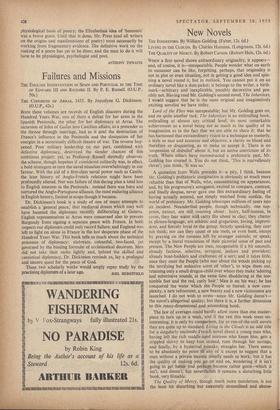Failures and Missions
BOTH these volumes are records of English disasters during the Hundred Years War, one of them a defeat for her arms in the Spanish Peninsula, the other for her diplomacy at Arras. The
incursion of John of Gaunt into Castilian affairs, as a pretender to the throne through marriage, had as it goal the destruction of France's influence in the Peninsula and the dissipation of her energies in a notoriously difficult theatre of war. The reverse hap- pened. Poor military leadership on our part, combined with defective diplomacy, destroyed the slender chances of this ambitious project; yet, as Professor Russell shrewdly observes.
the scheme, though hopeless if considered militarily was, in effect, a bold stratagem to turn the naval situation overwhelmingly in our favour. With the aid of a first-class naval power such as Castile, the later history of Anglo-French relations might have been profoundly altered. Nor was failure of this daring plan a total loss to English interests in the Peninsula : instead there was born and nurtured the Anglo-Portuguese alliance, the most enduring alliance in English history, limited in scope though it became.
Dr. Dickinson's book is a study of one of many attempts to establish a 'general peace,' that medimval dream which may well have haunted the diplomats recently deliberating at Geneva.
English representatives at Arras were concerned also to prevent Burgundy from signing a separate peace with France. In both respects our diplomats could only record failure; and England was
left to fight on alone in France in the last desperate phase of the Hundred Years War. This book tells us much about the technical processes of diplomacy: elaborate, colourful, two-faced, yet governed by the binding formulm of ecclesiastical decorum. Men did not take their oaths lightly. and, hehind the skilled and casuistical diplomacy, Dr. Dickinson reminds us, lay a profound and sincere quest for the peace of God.
These two scholarly works would amply repay study by the
practising diplomats of a later age. JOEL HURSTFIELD


































 Previous page
Previous page